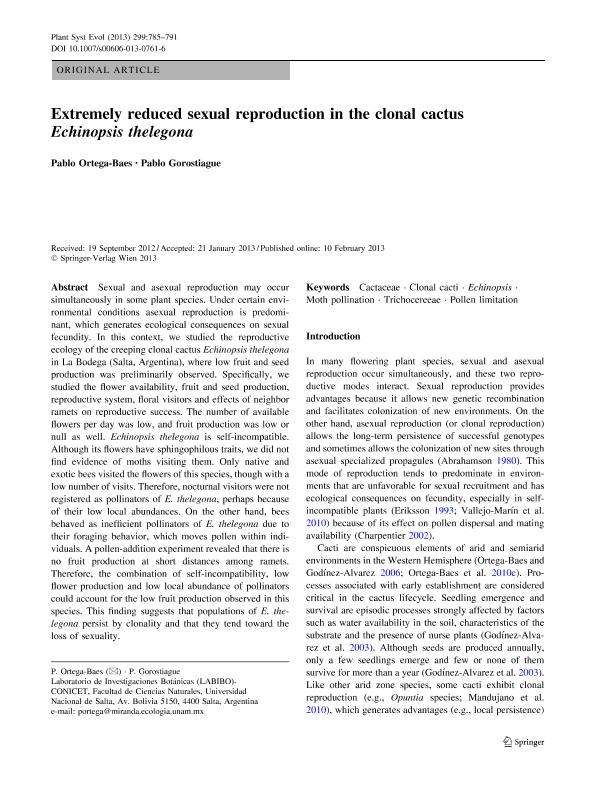Mostrar el registro sencillo del ítem
dc.contributor.author
Ortega Baes, Francisco Pablo

dc.contributor.author
Gorostiague, Pablo

dc.date.available
2019-06-07T20:11:19Z
dc.date.issued
2013-04
dc.identifier.citation
Ortega Baes, Francisco Pablo; Gorostiague, Pablo; Extremely reduced sexual reproduction in the clonal cactus Echinopsis thelegona
; Springer Wien; Plant Systematics and Evolution; 299; 4; 4-2013; 785-791
dc.identifier.issn
0378-2697
dc.identifier.uri
http://hdl.handle.net/11336/77813
dc.description.abstract
Sexual and asexual reproduction may occur simultaneously in some plant species. Under certain environmental conditions asexual reproduction is predominant, which generates ecological consequences on sexual fecundity. In this context, we studied the reproductive ecology of the creeping clonal cactus Echinopsis thelegona in La Bodega (Salta, Argentina), where low fruit and seed production was preliminarily observed. Specifically, we studied the flower availability, fruit and seed production, reproductive system, floral visitors and effects of neighbor ramets on reproductive success. The number of available flowers per day was low, and fruit production was low or null as well. Echinopsis thelegona is self-incompatible. Although its flowers have sphingophilous traits, we did not find evidence of moths visiting them. Only native and exotic bees visited the flowers of this species, though with a low number of visits. Therefore, nocturnal visitors were not registered as pollinators of E. thelegona, perhaps because of their low local abundances. On the other hand, bees behaved as inefficient pollinators of E. thelegona due to their foraging behavior, which moves pollen within individuals. A pollen-addition experiment revealed that there is no fruit production at short distances among ramets. Therefore, the combination of self-incompatibility, low flower production and low local abundance of pollinators could account for the low fruit production observed in this species. This finding suggests that populations of E. thelegona persist by clonality and that they tend toward the loss of sexuality.
dc.format
application/pdf
dc.language.iso
eng
dc.publisher
Springer Wien

dc.rights
info:eu-repo/semantics/openAccess
dc.rights.uri
https://creativecommons.org/licenses/by-nc-sa/2.5/ar/
dc.subject
Cactaceae
dc.subject
Clonal Cacti
dc.subject
Echinopsis
dc.subject
Moth Pollination
dc.subject
Pollen Limitation
dc.subject
Trichocereeae
dc.subject.classification
Otras Ciencias Biológicas

dc.subject.classification
Ciencias Biológicas

dc.subject.classification
CIENCIAS NATURALES Y EXACTAS

dc.title
Extremely reduced sexual reproduction in the clonal cactus Echinopsis thelegona
dc.type
info:eu-repo/semantics/article
dc.type
info:ar-repo/semantics/artículo
dc.type
info:eu-repo/semantics/publishedVersion
dc.date.updated
2019-05-23T18:49:42Z
dc.identifier.eissn
1615-6110
dc.journal.volume
299
dc.journal.number
4
dc.journal.pagination
785-791
dc.journal.pais
Austria

dc.journal.ciudad
Viena
dc.description.fil
Fil: Ortega Baes, Francisco Pablo. Universidad Nacional de Salta. Facultad de Ciencias Naturales. Escuela de Agronomía. Laboratorio de Investigaciones Botánicas; Argentina. Consejo Nacional de Investigaciones Científicas y Técnicas; Argentina
dc.description.fil
Fil: Gorostiague, Pablo. Universidad Nacional de Salta. Facultad de Ciencias Naturales. Escuela de Agronomía. Laboratorio de Investigaciones Botánicas; Argentina. Consejo Nacional de Investigaciones Científicas y Técnicas; Argentina
dc.journal.title
Plant Systematics and Evolution

dc.relation.alternativeid
info:eu-repo/semantics/altIdentifier/doi/http://dx.doi.org/10.1007/s00606-013-0761-6
dc.relation.alternativeid
info:eu-repo/semantics/altIdentifier/url/https://link.springer.com/article/10.1007%2Fs00606-013-0761-6
Archivos asociados
